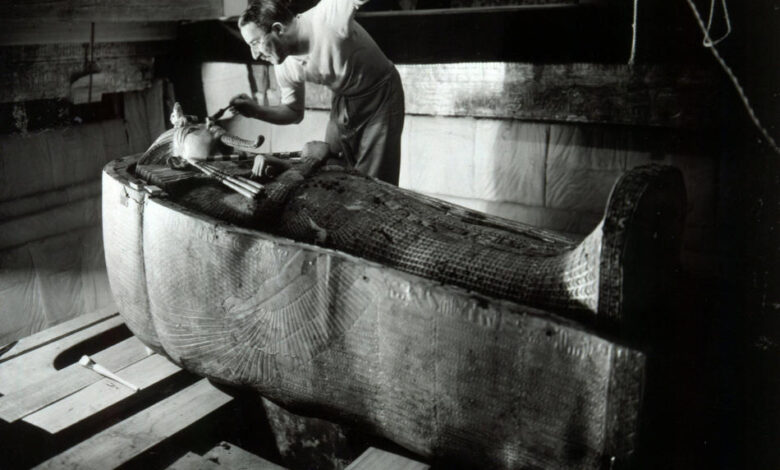
On November 4, 1922, English archaeologist Howard Carter discovered the tomb of the golden pharaoh, Tutankhamun.
To this day, over a century after the discovery of the tomb and its treasures, it remains the most significant archaeological find in the world.
One would expect Egyptians to love Howard Carter and even build a statue to honor his efforts in uncovering the tomb, an event that made Egypt’s name echo around the globe. Yet, the opposite happened.
Egyptians came to hate Howard Carter, and protests broke out demanding his expulsion from Egypt and the protection of Tutankhamun’s treasure.
The Egyptian government was quick to act, closing the tomb and suspending his work.
Before anyone accuses Egyptians of having been unjust to Howard Carter, lets present the following facts:
Howard Carter, the archaeologist, and his financier, Lord Carnarvon, along with Lord Carnarvon’s daughter, Lady Evelyn Herbert, secretly entered the tomb before the discovery was officially announced.
It was as if the tomb had been found in London, not on Egyptian soil, which belonged to a government and a people who had every right to know what was happening on their land.
Soon after the public announcement, Carter pillaged several small artifacts, some of which he gifted away during his lifetime, while others were sold after his death. He and Lord Carnarvon then demanded half of the tomb’s treasures from the Egyptian government, claiming it wasn’t a fully intact royal tomb.
After Lord Carnarvon died a few months later, Carter claimed that the Lord’s heirs had a right to half of the artifacts as compensation for the large sums of money he spent on the excavation.
Strangely, before his death, the Lord had sold the publication rights for news of the discovery to the London Times and had received a payment. Local Egyptians had to rely on translations of the English newspaper to learn what was happening inside the tomb.
Even more shocking, Lord Carnarvon had been promising artifacts from the tomb to foreign museums, especially the British Museum and the Metropolitan Museum of Art, as if he had inherited these treasures from his own family.
Carter’s despicable actions continued as he allowed his guests to visit the tomb while denying entry to high-ranking Egyptian government officials. He acted as if he owned the tomb and as if Egypt had no claim to its pharaoh’s treasures.
In response, the Egyptian government closed the tomb and expelled Carter.
Carter and Lady Evelyn then filed lawsuits against the Egyptian government, appointing lawyer George Mercibach as their representative to defend what they believed was their right to the treasure. (Incidentally, George Mercibach was the founder of the Qasr El Nil Club, now known as Zamalek).
After a series of lectures in America and Europe, from which he earned a large sum of money (thanks to Tutankhamun), Carter returned to Egypt in January 1925. He and the Lady then reached a settlement with the Egyptian government, agreeing to drop all lawsuits against Egypt and cease demanding a share of the treasures.
In return, the Egyptian government allowed him to resume his work and financially compensated Lady Evelyn.
Here is a part of what Carter wrote on the matter: “Allow me to propose to Your Excellency that the Countess Carnarvon would be grateful if you would grant her permission to resume work under the conditions that have been communicated to her. She will make it her duty to renounce any legal action, claim, or allegation, whatsoever, regarding the tomb of Tutankhamun and the artifacts discovered within it.”
The agreement was reached. The Egyptian government granted Carnarvon’s daughter £35,867, a massive sum at the time.
The government did not waste time debating how much money the Lord’s family made from the exclusive contracts he granted to English newspapers, or how much Carter himself earned from his lectures about the discovery in the US and Europe.
The government understood that keeping the treasure of Tutankhamun in Egypt was far more important than all the money and gold in the world, and it was certainly right to do so.
Circling back to Carter, who received almost a quarter of the compensation from the Countess as a reward for his loyalty to the Lord and his family.
Howard Carter died at his home in London on March 2, 1935, at the age of 65, due to cancer. He was buried in Putney Vale Cemetery in London, but no archaeologists attended his funeral.
Egypt has indeed succeeded in protecting Tutankhamun and standing against the despicable colonial desires of a man who, despite having no university education, was not ashamed to call himself an archaeologist. He dared to put himself on an equal footing with a country like Egypt, its people, and its government.
However, we must be fair and acknowledge that we bear a great share of the responsibility for what happened, because we allowed colonizers to excavate our land and loot our treasures.
What’s even more astonishing is that they were the ones who proposed the laws governing the administration of antiquities in our country. And people still wonder how all these treasures left our country.




